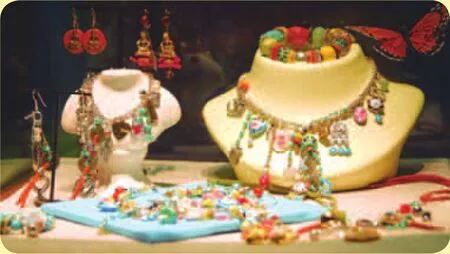The Price of a Necklace
一沁供稿
翻译:Crazier
The Price of a Necklace
一沁供稿
翻译:Crazier
“无价的”项链
大家都知道诚实是美德,可有时候我们也需要找准说实话的时机。


After the death of a jeweler, his family got into financial trouble.
One day, the jeweler’s wife took one of her1)necklace ['nekləs] n. 项链necklaces and said to her son, “Son, take this necklace to your uncle’s shop and ask him to give you money.”
The boy went to his uncle and gave the necklace to him.
His uncle looked at the necklace carefully and said, “Son, tell your mother that right now the market is not good. She can sell it later.”
Then his uncle gave him some money, and asked him to come the next day and learn to work with him.
From the next day, the boy started to learn how to2)examine [ɪg'zæmɪn] v. 检查examine jewels.After some time, he got really good at examining jewels and soon people began to ask him to check their jewels.
One day, his uncle said to him,“Son, tell your mother that now she can sell that necklace.”
The boy went home for that necklace. When he examined it, he found that it was3)fake [feɪk] adj. 假的,伪造的fake.
He went to his uncle and said, “I didn’t bring that necklace. Uncle, why didn’t you tell us the necklace was fake the first time?”
His uncle replied, “You were broke at that time. If I had told you,you would have thought that I don’t want to help. But now you have knowledge about jewels, you can4)tell [tel] v. 分辨,辨别tell by yourself.”
参考译文

某珠宝匠死后,他们一家的生活变得十分拮据。
一天,珠宝匠的妻子拿出一条项链,并对她的儿子说:“孩子,把这条项链拿到你叔叔的店里去,让他换点儿钱给你吧。”
男孩来到他叔叔的店里,将项链交给了他。
他的叔叔细细打量了一会儿项链,说道:“孩子,告诉你妈妈,现在市场行情不好。她可以晚点再把它拿出来卖。”
然后他叔叔给了他一些钱,并让他第二天再过来学艺。
自第二天起,男孩就开始学习如何鉴定珠宝。过了一段时间,他成了珠宝鉴定专家,很快人们都开始把珠宝拿来给他鉴定。
有一天,他的叔叔对他说:“孩子,告诉你妈妈,现在可以把那条项链拿来卖了。”
男孩回家找他妈妈拿了项链。可当他在进行鉴定时,他发现项链其实是假的。
男孩找到他叔叔并对他说:“我没把项链带来。叔叔,为什么你不一开始就告诉我们项链是假的呢?”
他叔叔回答道:“那时候你们生活很困难。如果我告诉了你们,你们会认为我不想帮你们的。但是现在你自己对珠宝已经很了解,可以自己来分辨珠宝的真假了。”
名师考点小结
1. ask sb. to do sth.意为“要求某人做某事”,to后面跟动词原形。例如:
She asked him to wake her up at 6 o’clock. 她要求他在六点钟叫醒她。
拓展:当ask作“请求”或“问,打听”时,还可以用于“ask+间接宾语+直接宾语”的结构。例如:
Can I ask you a favor? 我能否请你帮个忙?
I asked him his name. 我问他叫什么名字。
2.“疑问词+动词不定式”作宾语。动词不定式前面有时会加上疑问词what/which/when/where/how等,这主要用于know/tell/wonder/ask/ find out/learn等动词或动词短语之后,用作宾语。例如:
I have learnt how to use the computer. 我已经学会如何使用电脑了。
3. Why don’t/doesn’t/didn’t sb...?意为“为何不(做)……呢?”,其省略形式为“Why not…? ”,表示建议,实际上是希望对方去做某事。
Why don’t you go there with them?
=Why not go there with them?
你为什么不和他们一块儿去那呢?


